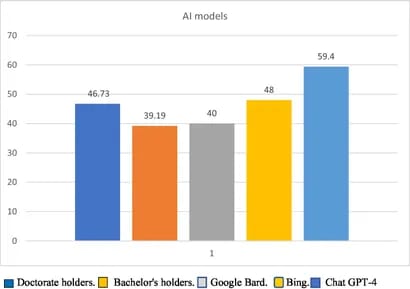- AI Weekly Wrap-Up
- Posts
- New Post 5-15-2024
New Post 5-15-2024
Top Story
OpenAI: The future is chatty assistants
On Monday, (a date carefully chosen to steal thunder from Google’s annual developers conference the next day) OpenAI gave a 26-minute master class on how to control the narrative on a developing technology. CTO Mira Murati emceed an eye-popping live demo of OpenAI’s newest AI model, GPT-4o (the “o” is for “omni”, as in omni-media.) Able to seamlessly juggle text, speech, and camera image, this is the helpful digital assistant that Siri always should have been (but now, even flirtier). TL;DR - your phone ain’t never gonna be the same. It’s evolving to be your always-available personal administrative assistant. Click the link to see the demo highlights - words fail to convey the “wow” factor.

OpenAI CTO Mira Murati demos their chatty, flirty new AI assistant
Clash of the Titans
Google: The Empire Strikes Back
On Tuesday, Google had its annual developers conference, known as Google I/O. With OpenAI playing the role of the scrappy, adorable rebels, Google at its own developers conference played the lumbering incumbent, trying desperately to get back up to speed. The best way to sum up Google’s slew of AI announcements is: solid, but uninspiring. Features like Photo Search (“find all my pictures which show my son playing with our dog”), having Search give an AI-generated summary in addition to links, having Gmail generate summaries and replies, and even their own new assistant Astra (“where did I leave my glasses?”) will no doubt prove quite useful, but it all feels incremental and piecemeal. Contrast this with OpenAI’s boffo demo of their all-in-one flirty assistant. Whoever ultimately wins the battle for AI market share, it’s clear that OpenAI continues to win the battle for mindshare.

Google CEO Sundar Pichai telling us how great his AI is going to be… someday.
Fun News
Bumble’s female CEO wants her AI to date your AI (and teach you how to flirt)
Dating app Bumble’s female Founder-CEO Whitney Wolfe Herd thinks AI can soften the dreary grind of trying to find that special someone. Soon, she thinks, AI can act as a dating coach, and help prospective daters practice their flirting skills with a supportive chatbot. Further out, she thinks that daters can have an AI dating concierge, that automatically screens all profiles in the area, suggesting the top few most compatible. Even further down the technology road, your AI dating concierge could interact with the prospective date’s AI concierge, to further vet them without all that messy in person interaction. Modern romance…

Solar storms knock out GPS tractors at peak of planting season
Most of the news about the recent solar storms have been about the spectacular aurora borealis light displays in the night skies. But the solar flares of highly charged ions that make the Northern Lights also disrupt the signal from GPS satellites. Modern farmers use centimeter-accurate GPS to guide tractors that plant corn in rows so straight and close together that crop yields are significantly increased. With no accurate GPS available, these tractors are sitting idle waiting for the solar weather to clear. All this is happening at the peak of the corn-planting season, and any significant delay can reduce the eventual crop yield for the year.

Underwater data centers can be kayoed by a pool speaker
AI needs a lot of servers (“compute”, in the lingo), and compute needs a lot of electricity - not just to power the servers, but also to cool them. One appealing solution to reduce cooling energy is to submerge the data center under water, where the sea provides unlimited cooling for free. Now researchers from the University of Florida and the University of Electro-Communications in Japan have found that undersea servers are vulnerable to an attack by sound waves tuned precisely to the resonant frequency of certain common hard drives. This attack is so effective that it can be delivered by a common pool speaker from 20 feet away. The researchers developed an AI system that detects incipient attacks and powers down the system to prevent damage.

Robot dogs with AI-aimed rifles tested by US Marines
This week’s top story above chronicles the latest strides in AI chatbot technology. The US military is experimenting with similar AI technology that can power semi-autonomous 4-legged robot “dogs” for use in warzones. These robot dogs can be used to carry in supplies, carry out wounded soldiers, perform reconnaissance missions, and even carry weapons that use AI to recognize enemy combatants. DOD policy forbids autonomous use of deadly force, so each weapon-carrying robot dog is paired with a human operator, who can be anywhere in the world, to make fire/no fire decisions.

AI in Medicine
Doctors can focus on patients, while AI writes the notes
Dr Rebecca Mishuris, Chief Medical Officer of Boston’s Brigham and Women’s Hospital, is part of a pilot program that allows her to pay attention to her patients, while in the background an AI system is transcribing the conversation. At the end of the visit, the AI summarizes the key points of the interaction into a draft note for the electronic record; it takes only a minute or two for Dr. Mishuris to read and edit the note, then sign it electronically. A process that can require a busy physician hours per week of charting outside of working hours, is now sufficiently automated that each note is signed before the physician sees the next patient. “EMR fatigue” is the number one factor cited by physicians as a cause of burnout. Multiple commercial AI systems now exist to ease that administrative burden on physicians, and free up hours of unpaid overtime.

Dr Rebecca Mishuris, CMO of Brigham and Womens Hospital, pilots AI notetaker
AI models beat psychologists on test of social intelligence
Researchers from Saudi Arabia and Qatar administered a standard test of Social Intelligence to counseling psychology students at the Bachelors and Doctoral level, as well as to several publicly available AI chatbots. It turns out that all the AI models scored higher than the Bachelors psychology students, and ChatGPT-4 outscored all of the human psychologists.

AI is poised to transform the practice of surgery
A Nature review article published 2 days ago details how AI is poised to transform all phases of surgery - pre-operative, intra-operative, and post-operative. Such a transformation promises to optimize surgical care, improve patient outcomes, and facilitate education. Tomorrow’s multimodal AI (handling text, speech, and image) should be an even more powerful tool for positive transformation.

UVA researchers develop AI risk assessment model for CHF
Researchers from UVA Health have developed an AI tool that can better predict outcomes for heart failure patients. The tool is designed to help clinicians make better treatment decisions, and so improve patient outcomes.

That's a wrap! More news next week.